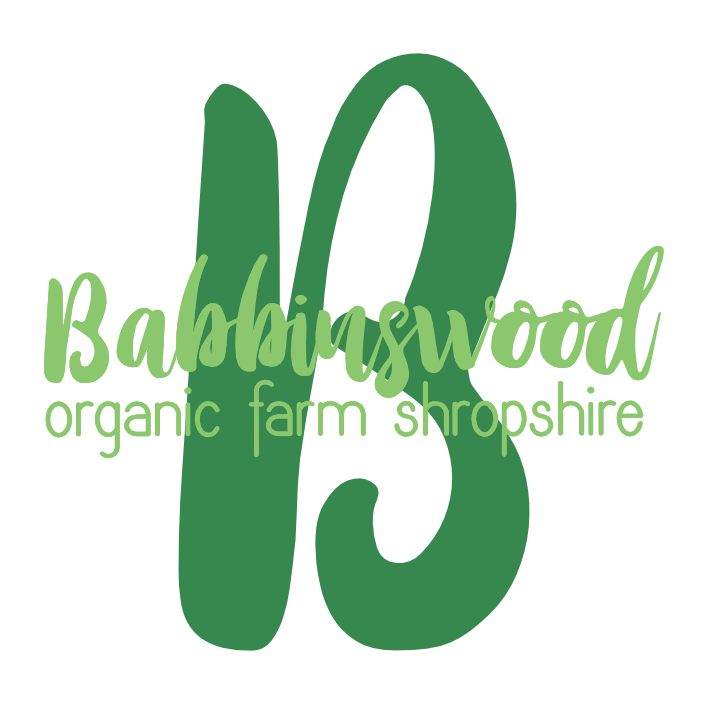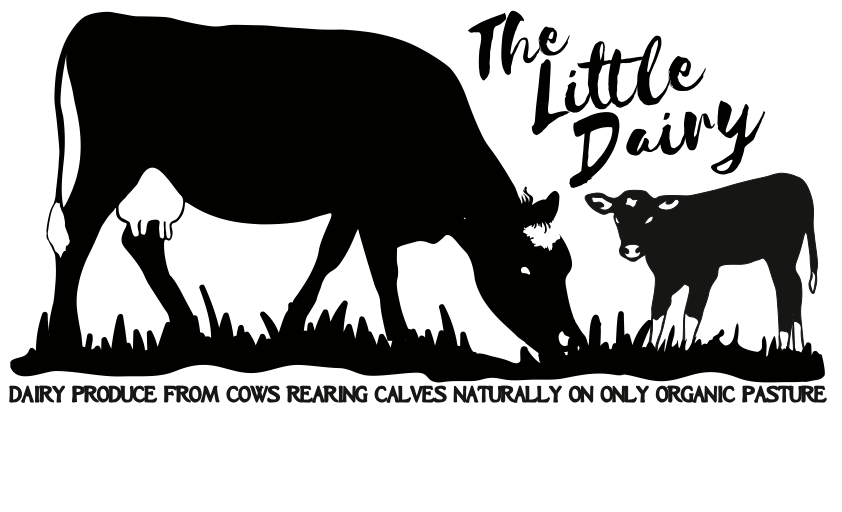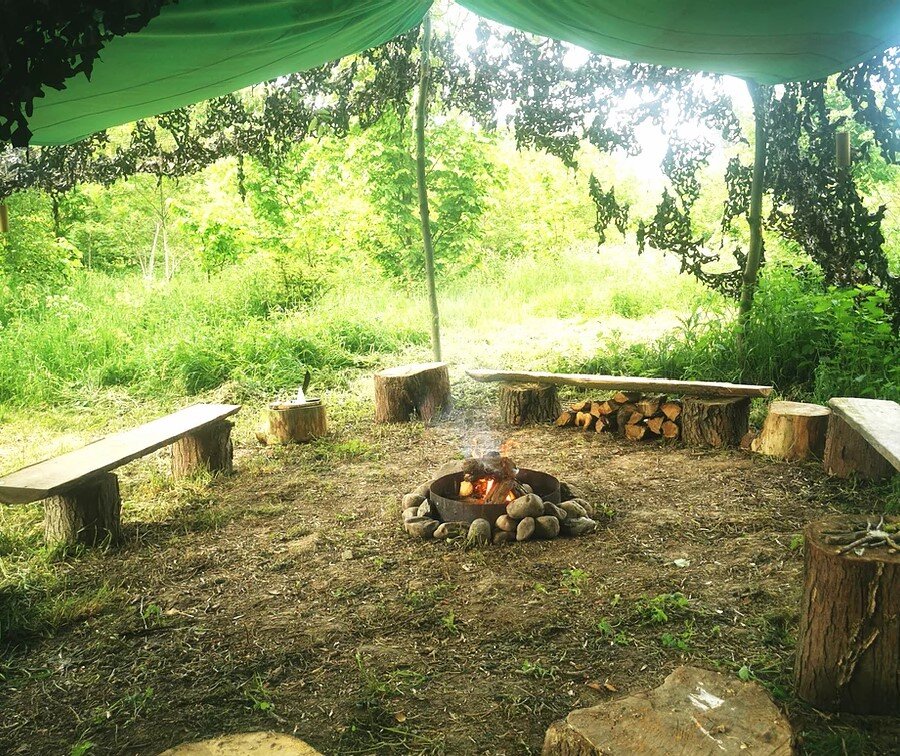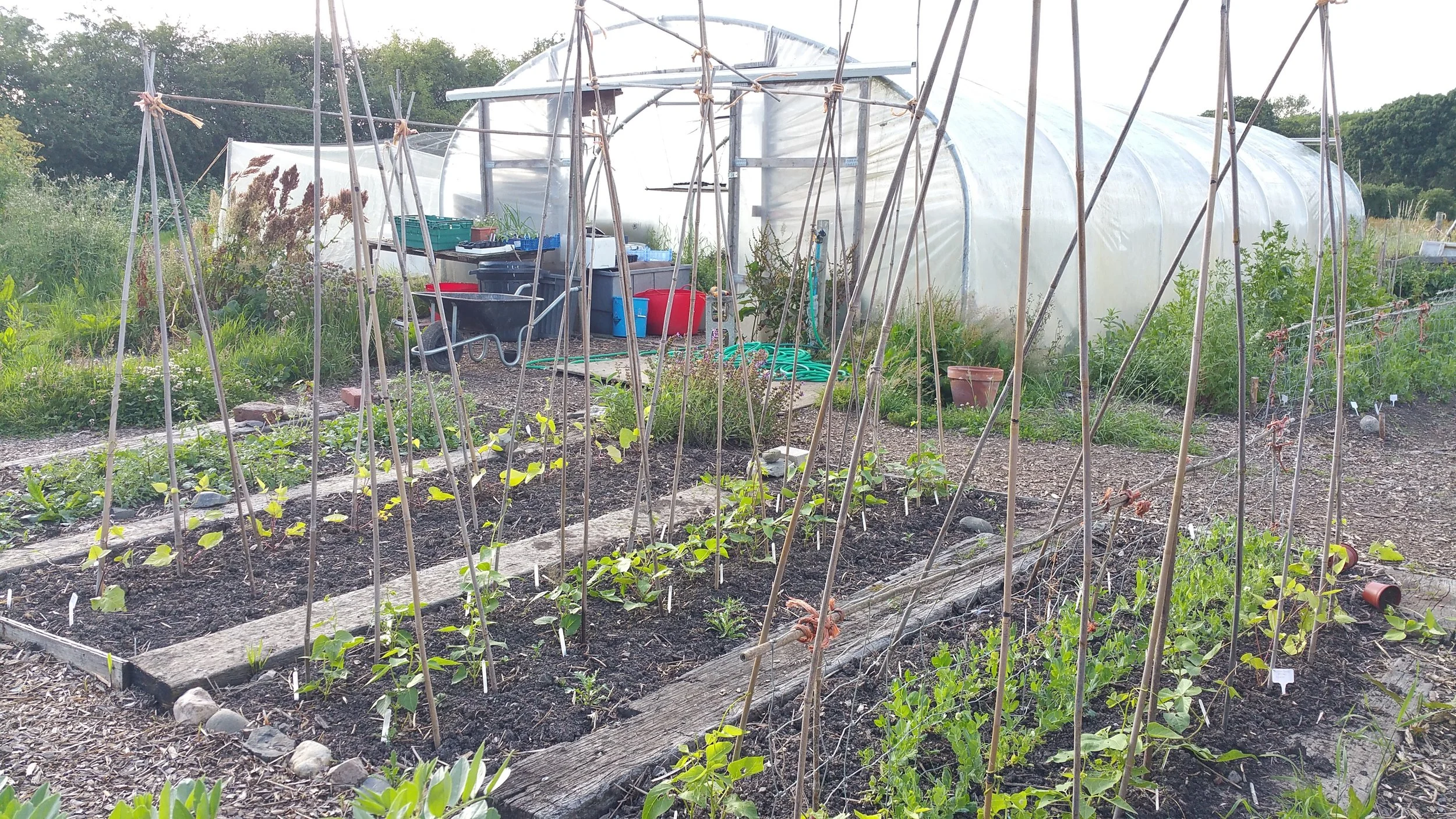The story so far…
by Barbara
Casha is the fifth generation in the family to farm at Babbinswood Farm. Casha and I farm here with her husband, Adam, and the support of a fantastic team.
Farm house 1949 - Front garden full of vegetables
Casha’s Grandpa milking 1974
From left Adam, Barbara and Casha
This teaching gave us an approach to farming focused on decision-making based on our “holistic context”
Before Casha returned to the farm in 2016, the farm was let out to a local organic dairy farmer, who put it into organic conversion from 2000, when Richard, my now ex-husband, decided to stop milking. Organic certification was achieved in 2002. In 2010 that tenant moved to another farm and I worked hard with Casha to find another organic farmer to keep the land in organic stewardship which we succeeded to do and this new entrant was here for the following 6 years. During this time, we met and took advice from other organic farmers and learnt as much as we could from them as well as attending conferences, courses and reading as much as we could. Although I had been very much involved in the farm during my marriage, I had focused more on the animals than the land management and during that time the farm was not managed organically. We had, and still have, much to learn. We have been very fortunate to have made some good friends and mentors within the organic farming community who have guided us on this journey. In 2016, I attended a Savory Institute Holistic Management Course taught by Christopher and Sheila Cooke of 3LM, which gave me deeper insights into farming and life in general. Later that year they taught the course again, this time at Babbinswood Farm, which Casha attended. My other two daughters, Nikki and Ally, were also at home during that course and took part in discussions. This teaching gave us an approach to farming focused on decision-making based on our “holistic context”
The context we all agreed on in 2016 when we just started out was:
“Babbinswood Farm exists to provide our family with a sustainable foundation, to ensure that the land and its special energy is handed down to future generations in a thriving state, whilst being a beacon of inspiration to others.”
A unique organic cow with calf micro-dairy where the cows are fed purely pasture
Casha wanted to begin with a dairy enterprise, it's in her blood after all - not just any dairy business - a unique organic cow with calf micro-dairy where the cows are fed purely pasture. Casha and I rescued a young heifer, April, who had become pregnant too young and couldn’t deliver her calf. We persuaded the owner to let us keep her and I performed a caesarian to save her life; sadly the calf was already dead but April became the foundation of our herd. Three other heifers from her group came with her, in return for work that Casha had done for the farmer, Honey, Peggy and Pixie. Casha began experimenting with dairy products, in particular making yogurt. Many years before, Richard and I had produced a Greek style yoghurt from the milk of our herd of 100 goats, so I had a little experience in this. Casha also registered for a license to sell raw milk. The herd expanded in 2017, when we added three Ayrshire cows, as demand for our high quality produce grew. At this time our retail outlet was a rustic outbuilding with a fridge and honesty box plus a local Food Assembly in Llangollen where we sold milk, yoghurt and soft cheese alongside veg boxes, curated by our volunteers and Ally, out of produce from our garden. We slowly built up a reputation for delicious milk and high animal welfare.
In 2019 our family grew and we welcomed George, my grandson. Casha and Adam were met with the steep learning path of combining parenting and farming - it is a real balancing act!
It was hard work but we all pulled together to make it work, helped in no small measure by Adam’s Dad and Mum.
Lessons from the pandemic
During the pandemic we were so grateful for our lifestyle, living and working on a farm. We were not subjected to the fate of most of the population which was restricted from going outside. Our animals needed us and thankfully we could continue our lives pretty normally. This period of time gave us time to reflect on what we had and appreciate how fortunate we were to have access to outdoors, beautiful animals and nutritious food. We knew then we wanted to share this good fortune by opening our farm up to the public, especially our local community.
Having other people on the farm was not new to us as we have welcomed hundreds of volunteers from all over the world since 2012. My holistic veterinary practice, Oakwood Veterinary Centre, onsite since 1994, meant that on most days there were visitors on the farm. After the pandemic we worked hard to make the farm more even more welcoming to new people. With the help of the community links, we expanded the farm shop to include more products, we grew the veg box business and invited like-minded businesses and people onto the farm. With the support from Shropshire Council, we created a welcome garden in the courtyard which was visited weekly by people from Avalon Day Centre which provides activities for adults with learning disabilities based in Oswestry. Our surplus food was donated to Osnosh, whose community kitchen uses surplus food to create delicious, nutritious meals in Oswestry. Lesley, one of our residents at Babbinswood Farm, took on the mantle of running the market garden and has since embraced it with her knowledge and expertise of forest gardening, perennial planting and biodynamic growing. The garden welcomes volunteers every Tuesday morning, to learn, talk and be outside. Lindsay from Blossom and Bee Kitchen started to utilise one of the farm buildings to start her conscious baking and catering business. She followed Nathan Bartram, who for a while baked delicious bread and pastries here, until returning to his life in sports education after the pandemic. Artist Sara Abbott used one of outbuildings as an arts studio. Natural builder Kim Greenwood was based here for a few years as well. These are just some of the examples of us welcoming the community onto a farm.
The farm business was also diversifying. Our focus was the need to get more good food grown here on the farm. The dairy business was growing which meant we could take on our first employee. Lisa, who if you haven’t met her, is one of the most hard-working, conscientious and eager to learn people I have ever met. Good Pickings joined us on the farm as a start-up business growing organic vegetables renting a 1 acre market garden. They tended the plot for nearly two years growing beautiful vegetables, all on what was once a permanent pasture field. Due to the uncertainty of the future of the farm, they have moved on to pursue new things.
As well as helping to run a diversified farming business, continuing my veterinary practice and finding precious time for our families and friends, in the background I was desperately trying to save the farm. I am explaining this to be open and honest and at the heart of this is a family trying not to be split apart. I had been separated for many years before deciding to get divorced. Rich had his new life in Uganda and I wanted to take control of my own future. It started out quite amicably hoping that the farm wouldn’t be broken up, but as often happens, different world views are tricky to reconcile so we decided it best to have a clean break. The simplest option would have been to sell the whole farm, split the proceeds and continue on our separate paths, however, many years before, I had made a pledge to the Universe and to this land to steward it to the best of my ability for as long as possible. For me that meant ensuring its organic, and thus regenerative, future. I saw this as the best way to contribute to the future of our planet including my children and grandchildren. To honour that pledge meant finding a way to purchase Rich’s share.
We had meeting after meeting with banks to help us fund this but our infant business didn't meet affordability checks and we kept hearing “no”. The pressure from the lawyers and the bills were mounting up but I was still determined to keep the farm together if I possibly could. In the end the only avenue left open was a bridging loan and in October 2022 I negotiated one for 12 months. There was no time to celebrate – I had to find a way of paying this off as soon as possible to minimise the interest payable. The first six months of having the bridging loan, taught us a lesson about the cost of letting our hearts rule our heads. It cost us dearly financially but also really knocked Casha’s confidence in farming.
We knew we were seriously running out of time and it looked like the only option was to sell all or parts of the farm….but I had not fought so hard and so passionately to keep this land organic to see it sold off to the highest bidder and then see it sprayed with soil damaging chemicals and ploughed up or developed and disappear under buildings.
We spent time and money looking at what we could do without. We could potentially sell off the buildings, another £3000 spent on feasibility studies, these would surely be snapped up by a developer who would convert as cheaply as possible using unsustainable materials. They might beautiful but what would be the lasting impact of those materials on the buildings or the people living in them and the environment. I could sell the farmhouse but where would we all live?
All these options that we explored went to against our judgement. Whatever piece of the farm would be lost - land, buildings or our home - it would ultimately leave a massive impact on our hopes and dreams of Babbinswood Farm being here for our community and future generations. A place where people can access the outdoors, good food and a place to learn and enjoy. Our vision included people enjoying walks around the fields and through the woodlands, learning about regenerative and organic farming, watching the cows, sheep and wildlife frolicking in the fields in their natural environment. A complex for the community to use including an organic café, a bakery, traditional craft workshops and creative spaces for the arts, as well as being home to our farm shop, dairy and of course my veterinary practice - would be lost forever if we failed in our quest.
Fighting for what I believe in, my purpose for being, at a huge cost
Seeing the successful journey of Fordhall Farm in Market Drayton.
I knew this is the only way to secure the future of Babbinswood Farm, as an organic working farm.
So we knew what we had to do - the only people that we would be happy to sell the farm land and buildings to is our community – those who understand the importance of what we have done up to now, the importance of keeping it together and what we need to keep doing into the future. The lure of selling up to the highest bidder, where I would see the farm divided up to make a quick buck and see the end of another small farm family farm, horrified me. I could not see that happen. The world is at a tipping point and I do not want to be a factor that contributes to that.
So here we are, I have incurred horrendous personal debt of over £150,000 in interest payments all in aid of seeing our vision turn into reality. We are so passionate about what we want, we just hope it is not too late.
We reached out to Charlotte at Fordhall farm to see if there was any way she can assist us in our 11th hour. Obviously concerned about the impending deadlines, Charlotte managed to remain positive that our vision for Babbinswood Farm was a wonderful story that could succeed if we had a enough time and the resources to do so. We took her advice and reached out to as many people who had been touched by the farm, past volunteers, shop customers, my loyal veterinary clients to ask for help. We registered our interest to create a community farming business with COOPs UK, and got funding to support further support from Charlotte.
I was due to pay the first bridging loan back on the 18th of October 2023 and I managed to negotiate to extend it for another three months, another £54,000 in fees and interest added to the costs. This is why a JustGiving fundraiser was started by Pip Waller, a friend of mine. I had always put off asking for help, unwilling to share the extent of the debt that had accrued due to choices I had made. We were so close to being able to register our community business and marketing the share offer which will keep the farm together. I could no longer afford to take on more debt, so the fundraiser was started to see if we had support from our community who could see potential in what we are trying to achieve. The support so far has been tremendous, our community has spoken and they do believe in us and what we are trying to save and why it is so important to be saved. This whole process has reminded me that what we are hoping to achieve by saving Babbinswood farm for our community; our future is much bigger than us and our family. It is for the health and well-being of the land which has been cared for organically since 2002 and it is for the health and well-being of the precarious biodiversity and wildlife struggling for survival and ultimately for those who need land to grow nourishing food way into the future.
A Community Consultation Meeting held on December 3rd was well attended even though snow had fallen and the weather was freezing. This gathering, facilitated by Charlotte Hollins, renowned for her work at Fordhall Community Land Initiative and CO OPs UK, was to hear the voice of the community, collect ideas and contributions for the farm's preservation.
At this meeting we collectively explored avenues to ensure the continued success and sustainability of Babbinswood Organic Farm. Together, we upheld our shared commitment to organic farming, environmental stewardship, and providing a special place for the community to nourish their mind, body, and soul.
We are immensely grateful for your unwavering support. Babbinswood Organic Farm is not just a farm; it's a community-driven legacy. Let's continue this incredible journey together!
With deep gratitude,
Barbara and the Babbinswood Organic Farm Family

































